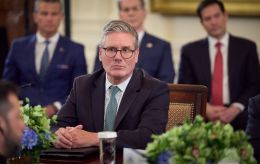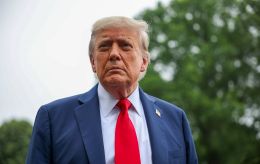Europe stunned? How Western media reacting to Trump’s remarks on Ukraine and Russia
 Donald Trump (photo: Getty Images)
Donald Trump (photo: Getty Images)
On February 12, diplomatic activity around the end of Russia's war against Ukraine reached an unprecedented level. US President Donald Trump held phone conversations with Russia's Vladimir Putin and Ukrainian President Volodymyr Zelenskyy. At the same time, US Secretary of Defense Pete Hegseth made many resonant statements about the unrealistic nature of Ukraine's NATO membership and returning to the borders of 2014.
RBC-Ukraine explains how these activities were assessed by leading Western publications and what signals they saw for Ukraine.
Сontents
- Politico (USA)
- New York Post (USA)
- Corriere della Sera (Italy)
- Frankfurter Allgemeine Zeitung (Germany)
- Rzeczpospolita (Poland)
On February 12, Donald Trump had a phone conversation with Kremlin leader Vladimir Putin and Ukrainian President Volodymyr Zelenskyy. As the US President wrote on TruthSocial, the dialog with Putin was long and very productive. He said that he and Putin agreed to work very closely together and that the respective teams should begin negotiations immediately. Trump briefed Zelenskyy on the content of his conversation with Putin. The two leaders also discussed various topics related to the war.
On the same day, the new US Secretary of Defense Pete Hegseth suggested in his speech at the Ramstein meeting that Ukraine's membership in NATO is not a realistic option as a security guarantee to end the war. In his speech, Hegseth called for a realistic assessment of the situation on the battlefield. In his opinion, returning to the borders of Ukraine before the annexation of Crimea and the outbreak of war in the eastern regions is an illusory goal that will prolong the war.
Also in Paris, the foreign ministers of Ukraine, France, the United Kingdom, Spain, Italy, Poland, Germany, and the European Union met. In a joint statement, the European foreign ministers said they were committed to Ukraine's independence, sovereignty, and territorial integrity in the face of Russia's war of aggression.
“We share the goal to keep supporting Ukraine until a just, comprehensive, and lasting peace is reached. A peace that guarantees the interest of Ukraine and our own,” the ministers said.
Read how the American and European media reacted to all these events in RBC-Ukraine's review.
Politico (USA)
After direct threats to Putin during his first days in office, Trump's new public stance on Putin looks like what Ukraine's supporters feared - a sharp turn in American foreign policy that is the opposite of President Joe Biden's approach, says Eli Stokols, a columnist for the liberal American agency Politico.
According to her, the previous US president broke off diplomatic relations with Russia and prioritized close coordination with Zelenskyy and NATO allies. Biden also never supported Ukraine's NATO membership prospects, although he was less blunt than Hegseth in Brussels.
But whereas Biden spoke of Ukraine's defense as an existential matter for all democracies, Trump continued to be indifferent about the nature of the struggle itself.
New York Post (USA)
It's time to find a lasting peace - which is only possible if all sides are realistic, writes the New York Post, an agency close to Trump's inner circle, in an editorial.
The difference between the current situation and previous years is that “we have a new US president — one who’s stronger, but also understands how to negotiate.”
Putin knows that he cannot overwhelm Donald Trump, as Joe Biden did, who regularly conceded when faced with the nuclear bluff of Putin, thus failing to support Kyiv hard enough and fast enough to force the Russians out. In the editorial's opinion, Biden has lost this opportunity forever: it is now pointless to demand that Ukraine return to the borders of 2014.
On the other hand, these years have crippled Russia's economy. Putin desperately needs to be able to sell his energy resources to the West again, especially if he wants to avoid complete subjugation by China.
So Putin will take a deal that allows him to save face and ensures that Western efforts to undermine Moscow's power in what he sees as its near abroad will cease. Instead, he should accept Volodymyr Zelenskyy's voice in the peace talks, even if his real negotiations are with Trump.
Trump should also recognize that Zelenskyy is the key to a stable future: If Ukraine's president is perceived as a participant in a farce about peace in our time, the whole country will look and feel weak - and Putin's tanks will likely start rolling again soon.
Likewise, making a deal with Kyiv on rare earths is a smart move by Trump to ensure US support for Ukraine and peace. The public sees that America is finally getting something for supporting Ukraine, and it establishes a clear US interest that any future Putin aggression will be threatened - thereby strengthening Kyiv's security.
Under these conditions, the peace agreement is a cold gamble by the warring parties, the agency concludes.
Corriere della Sera (Italy)
Vladimir Putin has already received the recognition he probably worried about the most, writes the agency's columnist Marco Imaricio. An exclusive dialog with the most powerful man in the world is in itself a demonstration of strength in the eyes of the world.
The sense of victory lies not in the start of negotiations, but in the fact that Russia, after years of isolation, was able to write a peace treaty for a war it started. As proof that the goal for Putin has already been achieved, the comments on the phone call between Putin and Trump never mention technical details like borders: who gets Donbas, who gets Kursk.
According to Imarisio, although Volodymyr Zelenskyy repeatedly asked Trump to talk to him first and then to Putin, the US president did the opposite. Now there is a feeling that a certain peace for Moscow can be achieved. However, the list of non-negotiables has expanded. According to Putin, who has never hidden his demands: disarming Ukraine, recognizing the state of affairs on the ground, annexing four Ukrainian regions, and lifting major sanctions. The new American president will have to decide whether to accept the proposal, which his predecessor considered humiliating for the entire West, emphasizes Imarisio.
Frankfurter Allgemeine Zeitung (Germany)
Trump's actions represent a major break with previous Western policy toward Ukraine. It goes a long way toward meeting Putin's needs and delegitimizes much of what has been said and done on the subject in major European countries, including Germany, in recent years. Under such circumstances, there will be no more victory for Ukraine, says Nikolas Busse, foreign policy editor of the liberal-conservative FAZ.
If Moscow were to agree to a ceasefire on these terms, it would undoubtedly be a great relief for the people of Ukraine and the soldiers on both sides. Geopolitically, however, it would likely usher in a new phase of uncertainty in Europe, as Russia could recharge its batteries and calculate that NATO, which is largely confined to Europe, would not be as challenging an adversary as it has been so far.
Although this development was obvious, it caught Germany unprepared, emphasizes Nikolas Busse.
Rzeczpospolita (Poland)
Despite the growing lack of fuel in the tanks of his war machine, Putin now has a president of the United States who respects him and wants to talk to him, says the editor-in-chief of the agency, Bogusław Chrabota.
In his opinion, Putin is still waiting for a photo of the American president shaking his hand. This moment will crown his career and confirm his success in the barbaric war he has unleashed. The first such photo will probably not be taken in Moscow, but, for example, during negotiations in Saudi Arabia. But then, why not in the Kremlin? This is the photo that Putin is most looking forward to.
It will finally present him as a full-fledged co-ruler of the world, a person equal in importance to the US president, and a representative of the American superpower.
This will call into question the crimes against Ukrainians. Exclusion from the international community will end. The threat of a criminal case at the ICC will dissipate. Putin and the Russian people will be sanctified, and their military efforts will be glorified. This will be the meaning of the photos with Donald Trump. The war will be won for the Russians.
Poland and the EU, according to Chrabota, will take a breather, and the end of the war will be a breath of fresh air that Europe has been waiting for. It will only take a moment for Trump to restore normal trade rules with Moscow. The French, Germans, Italians, and Hungarians will win. But not Warsaw, because it understands better than anyone else that the peace that Trump will negotiate will give Putin the belief that he is allowed to do anything. Whatever crimes he commits, someone great will lend him a helping hand.
According to Chrabota, there is no doubt that the deal will be made on the political corpse of Volodymyr Zelenskyy. He will have to leave after losing the election, which Trump has already mentioned. “Will America take the rest of Ukraine under its umbrella or not? We'll see,” Khrabota writes.
Sources: Politico, New York Post, Corriere della Sera, Frankfurter Allgemeine Zeitung, Rzeczpospolita

